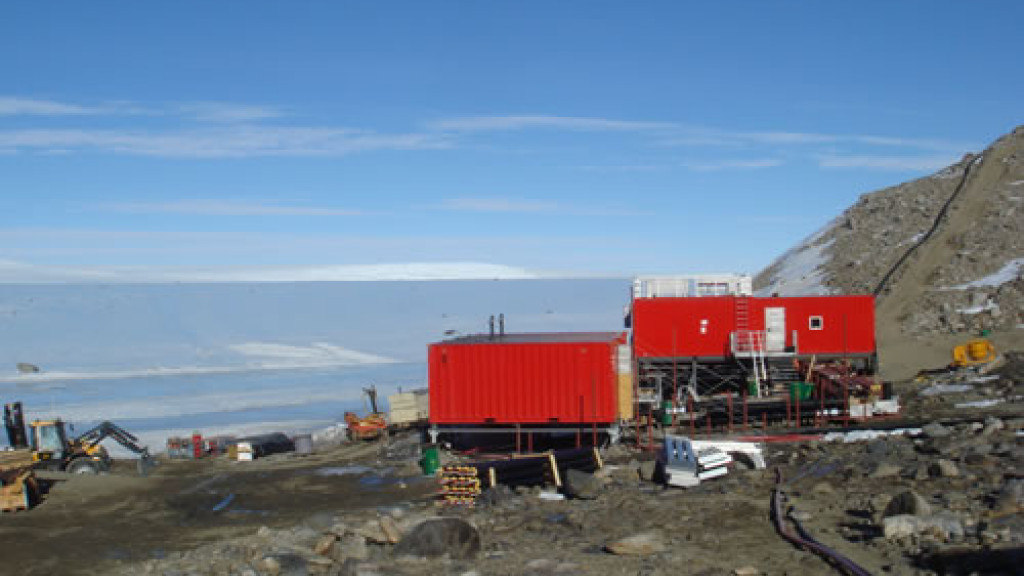BELARE 2006/2007 - Troll station
Morning broke early in the Southern Hemisphere for our sleep deprived group. The cockpit lay open at the front of the plane, and as the cargo was loaded mainly in the back, there were no restrictions to moving forward to visit the pilots, which at first we did a little uncertainly, unused to such familiarity, and such a departure from 21st century norms. Truly, we had left the World of the digital passport, and hand baggage restrictions and entered an earlier more innocent age, when sitting with the pilots to admire the sunrise was as normal as watching endless videos on the in-flight entertainment. As we raced over the icy ocean towards the fast approaching Antarctic coast with the Orvin Mountains standing like a blue tear on the milky horizon, we felt the first tightening in the stomach, in apprehension at the challenging days ahead. Alain becomes thoughtful as he looks out at the mountains of the Dronning Maud Land. He has climbed many of their jagged peaks: the Holtanna, the Ulvetanna, and their sisters.
We catch sight of the thin white on white line from the coast showing were the Norwegian Antarctic Research Expedition unloaded from the Ivan Papanin and headed to Troll. From the air we can see clearly the crevasse zones that they turned to avoid.
Before long, we are coming up to the Troll air strip, like a blueish rectangle on the endless ice. The Orion flies in low to allow the Pilot to see the state of the runway. We can see the skidoos and other vehicles waiting on the edge of the runway for us to arrive. Like a horse scenting home, the pilot exuberantly pulls back on the throttle and sends us wheeling up into the sky in a steep tight arc that flattens us against the bulkhead. It is so unexpected, that we shout out with glee, like kids on a roller coaster. The sky spins overhead and then it's not sure which is sky and which ice. He brings us around in an arc and a few minute later, safely buckled in our seats, we land in a smooth perfect landing, exhilarated by the excitement of the arrival.
Once off the plane, we immediately meet up with Philippe and Frank, the two team members from the Défense, who have come from Wasa to Troll. They have come to meet us at 5 in the morning, and the air is soon thick with light hearted banter. It is not sure whether we will go first (onward to Novolazarevskaia, or Novo as it is affectionately called among those in the know) or whether it will be the German team from the Alfred Wegener Institute, who are heading for Neumayer station. The Basler arrives. The weather is uncertain at the coast, but finally they leave first, after we have all ceremoniously shaken hands.
The Troll station manager, Ken Pedersen, invites us to stay with them until the time for our flight to Novo. We clamber aboard the sledges and are pulled back to Troll where we eagerly breakfast, and admire the comforts of the station. The team is briefed, and we make the most of the facilities to send a last e-mail, make a few photocopies and to discuss the logistics. The Norwegians are kind and helpful, giving us freely of their hospitality and advice on the traverse we are planning. We seem to have stumbled on a Utopic world – it is a little overwhelming.
After lunch, we wait for news from Novo that the Basler is on its way. It finally signals its departure and we collect the provisions kindly given to us by John and Ken to tide us over until we can reach the ship for unloading. The ice conditions have blocked the Ivan Papanin 17km off the coast, with no access to the ice cliffs where we must unload. The ice shelf is not very secure and the ship is unable to advance far enough to reach an unloading site.
The ship's captain, the crew, and our three team members are all becomingly increasingly impatient. We try to reassure them that we are doing our best to get to them as soon as possible.
The Basler is also an iconic plane. When it arrives, we admire its fine lines and then begin to load her for the flight to Novo. Our Canadian pilot, Brian, tells us that it is too late to go to Utsteinen today, and that we will be lodged at Novo. The weather takes a turn for the worse. As we arrive in Novo, and settle into our tents, it is clear that visibility is fast declining and the wind makes the tents snap and rustle ominously.
The warmth of the tents is welcome, as we prepare for the coming days without creature comforts. After dinner, we prepare our equipment sorting out what will go to Utsteinen and what will go to the coast. Sleep comes quickly.

